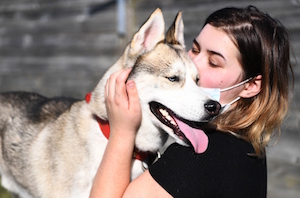Online sessions with therapy dogs can help reduce stress.
College campuses have introduced therapy dogs in the last couple of years to help reduce stress. Once therapy dogs are introduced into campus life, the response and interest from students always surpasses the ability for programs to meet the demand.

Virtual canine comfort is a new emerging approach, and it works!
Spending time with therapy dogs is one proactive way for students to chip away at potentially debilitating levels of heightened stress of college and university life. College administrators have increasingly been seeking innovative ways to encourage students to safeguard their mental health.
In-person canine visitation programs or canine-assisted interventions are themselves a relatively new way for students to enhance their well-being. Some campuses are now introducing “Virtual Support” programs.
- The University of British Columbia has instituted a program called Building Academic Retention through K9s (B.A.R.K.)
- Students use it as a way to reduce their homesickness, decrease stress and foster interpersonal connections.
Restrictions on in-person sessions led the B.A.R.K. program to collaborate with human-animal interaction researcher Christine Tardif-Williams who created pre-recorded virtual canine comfort modules.
- According to researchers, “We set out to conceptualize, design and deliver a series of virtual canine comfort modules that mirrored, as close as possible, the experience of students in an in-person canine visitation session. These sessions consisted of a trained dog-handler team following a script that saw handlers welcome students and encourage reflection around stress reduction and mindfulness. Students were also asked to reflect on their social support networks.”
- Students could access these modules remotely, which support the well-being of students who are geographically isolated or in areas where well-being resources are overtaxed or nonexistent.
- The modules are posted online on a platform that students (and others) can access without needing to sign-up for an appointment or join a waitlist.
Researchers at UBC wanted to evaluate how well this remote approach would work in the real world.
 Before to releasing these modules, they conducted a randomized controlled trial to assess how the modules would affect students’ self-ratings of stress.
Before to releasing these modules, they conducted a randomized controlled trial to assess how the modules would affect students’ self-ratings of stress.- They assigned 467 undergraduate students to either synchronous (via Zoom) or asynchronous (pre-recorded YouTube videos) five-minute sessions that invited them to observe a dog—handler team or a handler-only condition.
- They assessed well-being before and after the sessions using measures like anxiety, loneliness, connections to others, positive and negative affect.
- Results showed that all students, regardless of condition, reported significant pre-to-post improvements in self-reports of most well-being measures. However, the conditions in which the therapy dog was present elicited the most significant reduction in self-reports of stress.
The researchers point out that while “additional research is needed, these initial findings are encouraging. They support the contention that, for students for whom attending in-person sessions are not an option, accessing virtual canine therapy modules can offer a momentary reduction in stress.”
Unlike in-person sessions that are scheduled at the convenience of program personnel, virtual canine comfort modules may be accessed as needed by students. Now the college instructors can make use of virtual canine comfort modules as part of “brain breaks” incorporated into a lecture to encourage students to reflect on, and take care of, their well-being.
[Link to B.A.R.K.] [B.A.R.K. goes Virtual]
